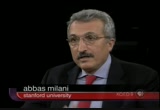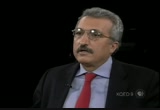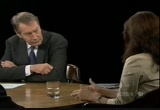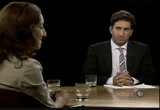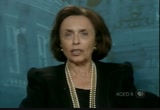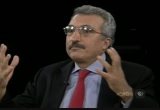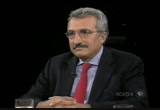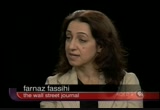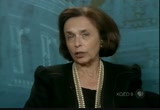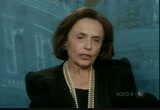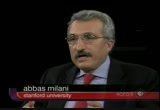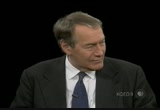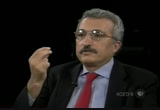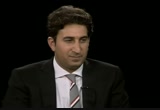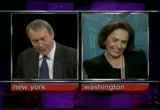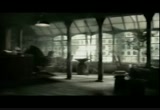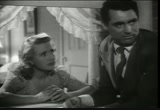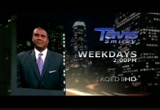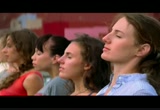tv Charlie Rose PBS September 24, 2010 11:40am-12:00pm PST
12:40 pm
important ayatollah -- the ayatollah that leads the prayers in gom said last week that the statistics that mr. ahmadinejad gives about unemployment, about inflation are all bogus. he said that people know these are bogus figures, quit giving them because you're undermining the credibility of the entire government. 40% of the entire liquidity of the iranian economy is now in bad checks -- in other words, the amount of bad checks, the amount of unpaid loans right now in the iranian economy is about three times it has been since the beginning of the banking for the last 150 years. that's how serious the economic situation is. but ahmadinejad walks around like mr. magoo, says everything is ok, we're going to withstand, it's going to make us stronger, as if he operates in a parallel universe that bears no relation to reality. >> charlie: as you suggested to me earlier, you have never seen
12:41 pm
a head of state that you think is prepared to say more untruths? >> i have never in my life seen a head of state look an interviewer in the eye -- look the camera straightforward and lie about something he knows the international community has been filled about the stories -- the story of the stoning. he said, "no one has been accused -- condemned to stoning in iran." for three weeks, that was the top of the news inside and iran and outside iran. he looked into the camera and he said, "i am the head of state, i say no one was stoned, end of story." >> charlie, whenever i watch ahmadinejad doing interviews, i am reminded of a famous "seinfeld" episode where george costanza asked the secret of lying and george said to jerry "it's not a lie if you believe it" and sometimes i think
12:42 pm
ahmadinejad is delusional, he believes that iran is the freest country in the world, he believes it has an incredibly prosperous economy. >> charlie: let me come back to the question of stoning. where does that stand? >> the case of this woman is suspended right now. however, there is documentation out there from iran's central courts where she has been condemned to stoning, where the sentencing was registered and it's available on the internet. human rights organizations have put that out in response to mr. ahmadinejad saying she was never sentenced to stoning. i suspect that after the international outcry she will not be stoned, especially after mr. ahmadinejad went on tv saying there is no such sentencing, so in some sense that is a victory for human rights workers in trying to bring attention, but i think it's not just stoning. we have hundreds of political prisoners in iran. we have human rights workers, lawyers, students, activists whose case nobody really hears. they're not celebrated cases but they face torture every day and
12:43 pm
unclear what's going to happen to their case and it's very difficult to get an answer from the government where their cases stand. >> charlie: when you raise that question as a journalist, what do they say? >> i asked this question. i asked this question of mr. ahmadinejad a few days ago at a breakfast with reporters and he looked at me and said "we have no opponents of the government in jail, and they're all free, and that there are no political prisoners in iran." >> charlie: it's not just on television he says it. >> no, it's not just on television. >> charlie: go ahead, haleh. >> charlie, there are women activists that have been sentenced to long-term imprisonment just while he was here. a human-rights activist, a woman who promotes women's rights was condemned to -- sentenced to six years.
12:44 pm
so these are unheard of, usually in the past they would get a month and would be set free. first, they gave her over $600,000 bail and then they condemned her -- sentenced to this long sentence. so it really is not just a matter of the single woman mrs. mohammedi. under ahmadinejad, the number of executions has increased by four times. the number journalists in jail is unprecedented in the world. and the clampdown on the press. so he's sitting there and just lying and looking in your eyes and in the eyes of everybody who is watching him on camera. >> charlie: and is this often talked about and debated in iran and in the press in iran and within the government of iran and the parliament? >> last 24 hours, one of the most high-plofile political prisoners in iran met with his
12:45 pm
wife and sent a -- highway-profile political prisoners in iran met with his wife and sent a message from prison that "i'm willing to come and debate ahmadinejad and show the lie to all his claims." this is someone in prison -- >> charlie: this has wide distribution in iran. >> it is widely distributed in iran. the regime tries to use these interviews as a sign, as they it as a sign of iran's importance in the international community the fact that everybody wants to interview him is not seen by them as the fact that he has become a mr. magoo character and has become a caricature of a head of state, they see it as a sign of importance and they milk it, and from political prisoners within the last 24 hours a gentleman who is the undersecretary in the interior ministry met with his wife and said, "tell the international community, these are all lies and i'm willing to come and show and debate and prove it is
12:46 pm
false." >> charlie: what do you do and what do all of you do and beyond those of us who are reporters, what do you do to bring the pressure of an international community to the human -- to those cases? >> i think it's absolutely essential that we continue to raise awareness. all of my friends who have been political prisoners in iran, including haleh will tell you it was heartening for them to know afterwards when they came out of prison that the world didn't forget about them. >> charlie: is the obama administration doing enough in terms of raising the issue of human rights? >> i think that they could be doing more. >> yeah. >> i think they could be doing more but aiven times looking in a broader context -- but oftentimes looking in a broader context of what the obama administration could be doing to help the green movement, we hear mixed feedback from iranians themselves as to the role the united states would like to play. some of the leaders of the opposition say they wouldn't
12:47 pm
like to see the united states be more outspoken but i think certainly the younger generation -- the young foot soldiers of this movement would like to see the u.s. more outspoken. >> charlie: i have asked this question. >> during the green movement protest last year, one of the slogans that people were chanting is, "obama, you're either with us or with them," meaning you take our side or you want to engage with the government" and i do believe that a lot of the green movement and opposition supporters believe that the obama administration has not done enough and they worry if the united states negotiates with ahmadinejad he will resurrect his troubles and his presidency and fix his legacy and then the opposition will lose credibility. >> charlie: what do you make of what the -- go ahead, haleh, i'll come back. >> charlie, i think that the obama administration can easily try and engage iran while condemn the violation of human rights. condemning the violation of human rights and the atrocities
12:48 pm
that are taking place in iran does not mean to come out overtly and let's say, "we support the green movement" so that it gives another excuse to the government in iran to repress on the activists because precisely saying, "didn't we say that they are promoting a velvet revolution, didn't we say that they are stooges of foreign governments?" but i think that the obama administration should continue, just as the president spoke this morning at the u.n., continue condemning what is happening in iran. >> charlie: is mossavi under house arrest? >> virtual house arrest the. i'm told when he's in his home and wants to communicate important messages to people, he will turn up the volume of the television at full blast and whisper in their ears or if it's ultrasensitive information he will write a note, show it to the person and tear it up.
12:49 pm
it's very difficult to lead an opposition movement under those circumstances. >> people who have been coming in and out of his houses have been interrogated, have been sometimes put under pressure. >> charlie: if change is to happen, a change of regime is to happen -- and therefore, a change of policy, how will it happen? >> i believe if it's going to happen, it's going to happen -- it is going to happen, but it will happen from within the country, just like the green movement which was an indigenous movement. it will not happen from outside the country -- the pressure on the government would be so much. the pressure on the regime would be so much. the economic pressuron them. the political isolation. that the regime will have to make extraordinary concession, and i'm told by people that it's not very -- i mean, the clerical community hangs on to power, so if they need to make concessions
12:50 pm
to survive, they will do these concessions. >> charlie: and you saw -- i'm told in the streets, people who were the sons and daughters of people who had been close to -- and in some cases of the regime, and their own children were in the streets. >> the people they put on trial -- they put 100 people on trial after the election -- so-called election, these 100 people, if you go down the list, these are the architects of this regime. these are the ministers, undersecretaries who really build this regime, and i think the change that you are talking about, you can already see the outline of a coalition that is forming. a coalition that includes some pragmatic elements win the clergy who are seeing that shiism is losing big time in iraq, the technocrats who are running this regime and know the
12:51 pm
status quo is untenable and the evolution who realize what they have and realize the continuation of the status quo is, of course, the danger of losing everything. >> charlie: as my friends say to me frequently, "why are you see fascinated, obsessed, interested in iran? >> because it's a wonderful country. >> charlie: paus it's a wonderful country. what else do i say? >> charlie: because it's a wonderful country. what else do i say? >> because in the middle east, i travel around the middle east all the time ooshths one of the only country where is this quest for democracy and change is grassroots and it's not from above, it's not like iraq or afghanistan where it's imposed by the government, it's actually kind of a secular movement. a people's movement has happened over the past couple of years. grassroots. and i think that's what's important. it's also important because it's strategically placed. it has oil. it's close to the persian gulf. it's got a lot of influence in
12:52 pm
the region. but other than that -- >> charlie: borders with efshg, almost. >> it borders -- >> charlie: borders with everybody, almost. >> it has a dynamic, educated population. >> iran is the bell weather state for the middle east, for the past 100 years everything has happened in the middle east either in iran, turkey or egypt. read the bible. read herodotus. the two two canonical texts about civilization. in the bible, there is no nation that plays a more significant role in the freedom of jews, in the building of jerusalem than persians. iran is not two-bit hustlers who rule the country now. iran is one of the oldest civilizations in the world. it has produced hafez. it has produced cyrus, and in
12:53 pm
the 20th century it is the bell weather state for the middle east. you are very right to like it. >> i sometimes think, charlie, iran is like classical music or wine. it's just something that is so complex and so deep and has so many layers, and when i read my own name in the press referred to as an iran expert i cringe, because i think that no one can be an expert on this country, it is so profoundly deep. >> charlie: haleh, i'll leave the last word to you. >> you are talking with someone who is in love with the flora and fauna of iran and feels to this day very betrayed by being arrested and put in jail by the country of my birth, that i love, but i think iran has always been a trend-setter, and even when it comes to women's rights, iran had one of the most
12:54 pm
progressive family laws in the region, and even after the revolution i'm meeting with iraqi women, meeting with women from the persian gulf, they would always tell me, "explain to us how the family law in iran worked so that maybe we can have a similar law." women's rights has been always an issue in iran, again a trend-setter in the region. >> charlie: haleh, thank you so much, glad to see you again albeit via satellite. glad to have you here. abbas, thank you for traveling from stanford university to join us this morning. we thank you very much. ♪ ♪ captioning sponsored by rose communications captioned by media access group at wgbh access.wgbh.org
276 Views
IN COLLECTIONS
KQED (PBS) Television Archive
Television Archive  Television Archive News Search Service
Television Archive News Search Service  The Chin Grimes TV News Archive
The Chin Grimes TV News Archive 
Uploaded by TV Archive on

 Live Music Archive
Live Music Archive Librivox Free Audio
Librivox Free Audio Metropolitan Museum
Metropolitan Museum Cleveland Museum of Art
Cleveland Museum of Art Internet Arcade
Internet Arcade Console Living Room
Console Living Room Books to Borrow
Books to Borrow Open Library
Open Library TV News
TV News Understanding 9/11
Understanding 9/11